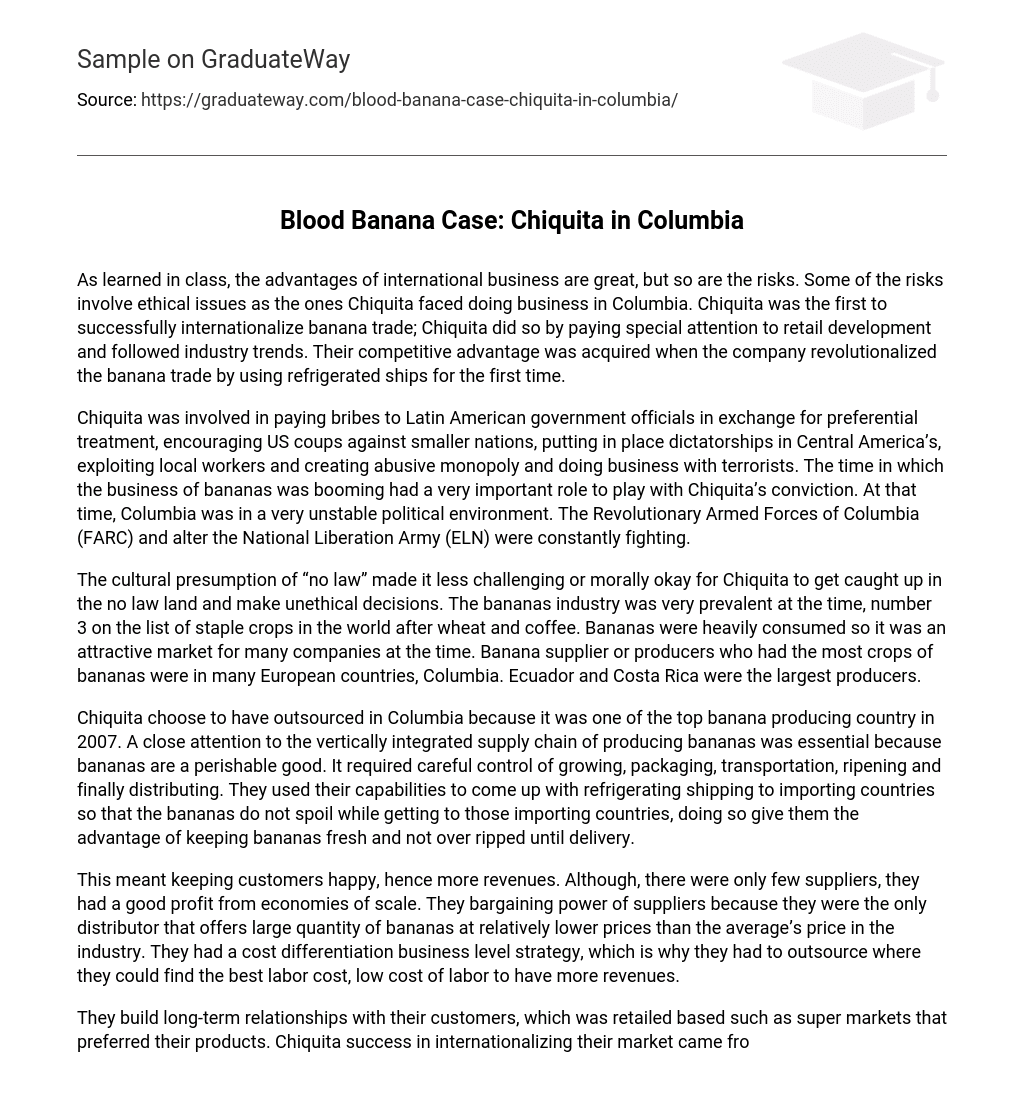The benefits and drawbacks of international business were discussed in class. International trade brings many advantages, but it also presents risks, including moral concerns. Chiquita, a company that pioneered the global banana trade, faced ethical challenges while operating in Columbia. Chiquita achieved success by focusing on retail growth and staying up-to-date with industry trends. Their competitive edge was gained through the groundbreaking use of refrigerated ships in the banana trade.
Chiquita has engaged in illegal activities like bribing government officials in Latin America and assisting the US in orchestrating coups against smaller nations. They have also been involved in establishing dictatorships, exploiting local workers, creating abusive monopolies, and conducting business with terrorists. The circumstances during which Chiquita operated in the prosperous banana industry era played a major role in their conviction. This occurred amid political instability in Colombia, marked by ongoing clashes between the Revolutionary Armed Forces of Colombia (FARC) and the National Liberation Army (ELN).
In an unregulated society, Chiquita capitalized on the absence of laws to participate in unethical conduct. At that time, bananas were immensely popular and held the third position globally among essential crops, trailing only wheat and coffee. The substantial demand for bananas made it a lucrative market for numerous firms. Europe served as the primary source of bananas, with Colombia standing out prominently. Ecuador and Costa Rica also played significant roles as major banana producers.
Chiquita decided to outsource its production to Colombia due to its status as one of the leading banana-producing countries in 2007. Proper management of the vertically integrated supply chain for banana production was crucial, given the perishable nature of the fruit. This involved careful control over cultivation, packaging, transportation, ripening, and distribution processes. Chiquita utilized their expertise to develop refrigerated shipping methods for exporting countries, ensuring that the bananas remained fresh and did not become overripe during transit.
Keeping customers satisfied and increasing revenues was the main objective for the business. Despite the limited number of suppliers, they managed to generate significant profits through economies of scale. The company held strong bargaining power over suppliers as they were the sole distributor capable of providing large quantities of bananas at lower prices compared to the industry average. To maximize profits, they implemented a cost differentiation strategy and sought out areas with favorable labor costs to outsource their operations.
Chiquita’s success in internationalizing their market stemmed from their strong customer relationships, particularly with super markets that favored their products. Their success was also attributed to their extensive study of the banana industry, possession of unique and non-reproducible resources, capital, and innovation, all of which provided them with a competitive advantage over other banana producers. Furthermore, Chiquita was able to acquire the necessary scale and upfront capital to enter the global banana trade. Dole and Del Monte were their primary competitors.
Dole, Del Monte, and Chiquita were the dominant companies in the banana industry, collectively referred to as “The Big Three.” Chiquita, in particular, focused on retail development and kept up with industry trends. The behavior of the top management at Chiquita influenced the employees and supervisors. If the top management endorsed unethical choices, the rest of the company would also follow suit. Unfortunately, Chiquita did not fulfill its corporate responsibility. They disregarded their core values, such as conducting business ethically and within the confines of the law.
Many companies facing financial difficulties are under pressure to satisfy shareholders. The pharmaceutical industry may be more vulnerable to the challenges faced by Chiquita in the past. Before a company decides to expand internationally, extensive research should be conducted on cultural factors, political conditions, and other relevant aspects. Awareness of foreign laws and regulations is crucial to avoid legal action against your company. The implementation of codes of conduct and the provision of ethics hotlines for employees should originate from senior management.
Companies must carefully consider their long-term and short-term objectives. Some companies, like Chiquita, prioritize profits above all else. This approach often results in problematic situations. While outsourcing can help reduce costs, caution must be exercised when choosing the countries for outsourcing to safeguard the company’s reputation. For instance, if a company outsources to a country with widespread corruption and unethical business practices like Nigeria, it may achieve profitability but compromise its moral values. The CEO’s characteristics also influence how the firm is perceived.
Whether you choose to make unethical decisions and quickly become profitable while doubling your shares on Wall Street at any expense, or you opt for ethical practices and prioritize doing things correctly, gradually attaining profits. Strategic planning plays a vital role in conducting international business by adhering to your core values and contributing to the community. Ensuring that the public perceives your firm positively is crucial as it attracts customers, resulting in increased revenues. The present Chief Financial Officer, Fernando Aguirre, believes he comprehends the extensive journey Chiquita has ventured upon from its current state.
He plans to restore Chiquita’s reputation by ensuring that the right products are readily available for distribution. I recognize that bananas currently make up 43% of Chiquita’s sales, but I believe they should cease banana production and explore alternative options, such as coffee or other prominent crops in the industry. Rebuilding a company’s reputation after such a negative legacy is extremely challenging. It is essential for them to prioritize their core values, reevaluate them, and effectively demonstrate them to both the company and the public. The journey ahead will be lengthy, but I have yet to witness their resurgence as the foremost firm in the banana industry.





